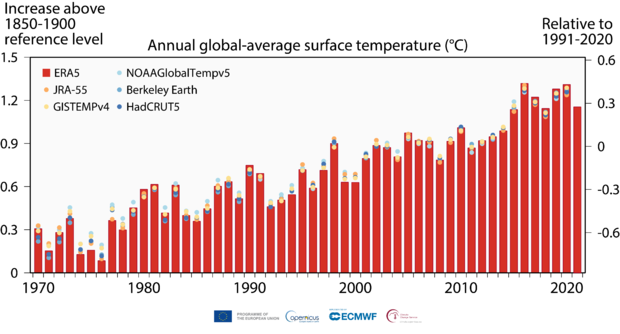The past 7 years have been the hottest on record "by a clear margin," scientists say
The past seven years have been the hottest ever recorded globally "by a clear margin," according to findings released Monday by scientists with the European Union's Copernicus Climate Change Service. Though 2021 was not quite as warm as other recent years, scientists warned that global greenhouse gas emissions are continuing to rise.
Last year, the researchers said 2020 was "effectively tied" for the warmest year on record — just behind 2016, which took first place. Now 2021 ranks fifth, sightly ahead of 2015 and 2018.
But while 2021 may have been slightly cooler than 2020, that doesn't mean the effects of climate change are lessening. Carbon dioxide levels reached a global record for the year, fueled in part by megatons of carbon that were released by wildfires, according to a press release summarizing the findings. Methane concentrations also reached record levels.
"Carbon dioxide and methane concentrations are continuing to increase year on year and without signs of slowing down," Vincent-Henri Peuch, director of the Copernicus Atmosphere Monitoring Service, said in the release. "Only with determined efforts backed up by observational evidence can we make a real difference in our fight against the climate catastrophe."
The heat was especially repressive in Europe last summer. The continent experienced its warmest summer on record, and Sicily broke the European record for hottest recorded temperature when it reached 119.8 degrees Fahrenheit (though the findings have not yet been confirmed by the World Meteorological Organization).
The hot, dry weather preceded "intense and prolonged" wildfires in Turkey, Greece, Italy and other countries, the Copernicus researchers said.
Climate scientists say global warming also increases the likelihood and intensity of disasters like the flooding that killed over 200 people last summer in Germany, Belgium and the Netherlands when rivers overflowed and roared through towns, destroying houses and historical structures that had lasted centuries. A Belgian government minister described the flood to The Brussels Times as "one of the greatest natural disasters our country has ever known."
North America also felt the impact this summer, recording the warmest-ever June for the continent and the hottest summer on record for the U.S. Hundreds of deaths were attributed to an extreme heat wave in the Pacific Northwest and British Columbia, Canada.
"I worried that people were just going to think of it as a nuisance but it really has been life-threatening," Multnomah County, Oregon, health officer Dr. Jennifer Vines told CBS News at the time.
The hot, dry conditions also fueled another year of devastating wildfires across the West.
Carlo Buontempo, director of the Copernicus Climate Change Service, said the findings "are a stark reminder of the need to change our ways, take decisive and effective steps toward a sustainable society and work towards reducing net carbon emissions."
Jeff Berardelli and Lilia Luciano contributed reporting.




